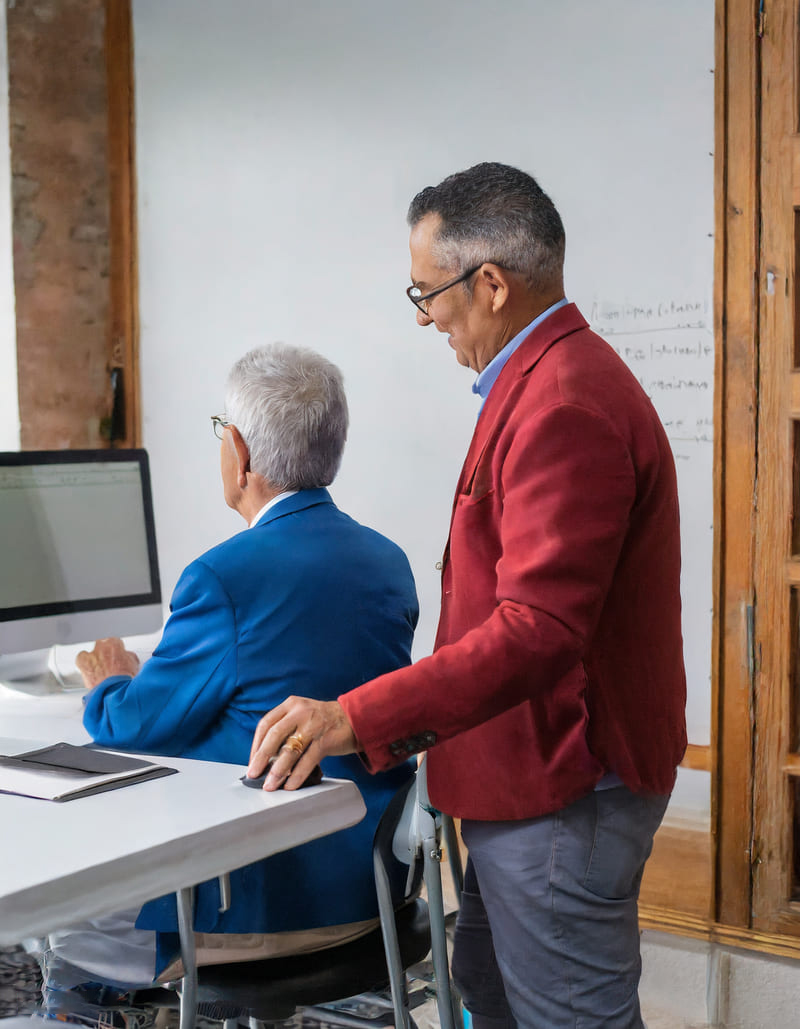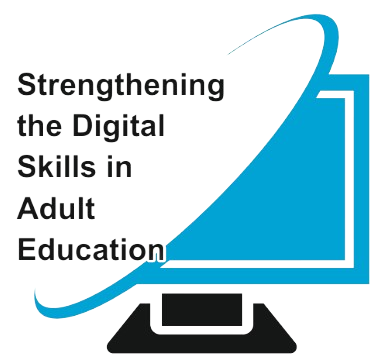Methodology on digital literacy in adults over in Greece and in Spain
The result of the project will be:

The methodology summary of the project entails achieving the following outcomes:

Training for teachers: Strengthening the digital skills in adult education
Training Course: Training for teachers: Strengthening the digital skills in adult education
Project: Strengthening the digital skills in adult education
Project Code: 2022-1-EL01-KA210-ADU-000080736
Venue: online
Dates: 01.11.2024-30.11.2024
Preliminary Requirements: A1 level proficiency in all DigCompEdu Framework
competences (Certification not mandatory)
Additional Resources Available: Computers, internet connection, digital projector,
speakers, headphones, tutors, online platform with materials, papers, pens.
Proficiency Profile: B1 – Integrator / B2 – Expert
Objectives of the Course:
Enhance digital literacy among adults, contributing to their full participation in the information society. Help adults develop their digital skills and use ICT and social networks creatively. Inspire participants to integrate technology creatively into educational settings, enhancing learning experiences and student engagement. Provide participants with a foundational understanding of coding and programming, empowering them to create simple digital projects and explore
problem-solving through technology.
Specific objectives of the Course:
Develop their critical thinking and skills for accessing reliable sources of information on the internet. Foster an understanding of the importance of digital citizenship and ethical online behavior. Teach adults how to use social media as a source of knowledge. Strengthen their status as active European citizens and cultivate a positive attitude towards continuing adult education. Provide a comprehensive introduction to coding through Scratch and Python, enabling participants to understand basic programming principles and create
simple digital projects. Encourage the development of critical thinking skills through the practical application of coding and the creation of educational content, promoting innovative problem-solving approaches.
Learning outcomes:
Participants will demonstrate a solid understanding of various digital devices, operating systems, and ommon software applications, enabling them to navigate and utilize technology effectively in both personal and professional contexts. Participants will understand common cybersecurity threats and implement basic security measures, including the use of antivirus software, secure passwords, and two-factor authentication, to protect their digital assets and maintain online safety. Participants will effectively use email, instant messaging apps, social media, and online collaboration platforms to communicate and collaborate efficiently in professional settings, including remote work environments.
Competences acquired by our learners:
Collaboration and communication: using digital technologies for communication as well as digital tools for work. Creation of digital content: producing and editing digital, interactive and engaging content in various formats and expressing oneself digitally. Understanding the digital environment: getting familiar with Social Media platforms, and having knowledge of security and privacy issues.
Training for teachers: Strengthening the digital skills in adult education for the management team
Training Course: Creation of Educational Video Games
Project: Strengthening the digital skills in adult education
Project code: 2022-1-EL01-KA210-ADU-000080736
Venue: Centro de Formación e Innovación de Inercia Digital.
Address: Plaza Tallista Miguel Hierro Número 9, A, 21007, Huelva, Spain.
Dates: to be decided.
Duration: 5 days courses (35 hours). According to the Flipped Classroom methodology,
it will take 20 presential hours (during the morning, from 9:00 to 13:00), and 15 hours of
self-learning out of this time slot from March 18 to 29, 2024.
Special instructions: 100% presence is required.
Preliminary requirements: An A1 level (newcomer) in all of the DigCompEdu
Framework competences (Certification not needed).
Additional resources available: computers, Internet connection, digital projector,
speakers, headphones, tutors, online platform with supporting materials, papers, pens.
Proficiency profile: B1 – Integrator / B2 – Expert
Objectives of the Course: The main objective of the course is to familiarize
teachers with WordPress as an educational tool in order to create blogs and
websites to use them in class or as a support tool for their students to work at
Home.
Specific objectives of the Course:
To create a blog and a website for educational purposes.
To manage the aspects of the blog as well as its content.
To keep updated the content of the blog in real time.
To share the blog and the content with colleagues or students.
To promote ICT teaching to boost its learning in the educational system.
Learning outcomes:
Participants will learn about the principles and the importance of creating and using
of blogs and web pages in order to make the educational process more interesting.
Participants will be taught the critical aspects for a web project planning.
Participants will become familiar with WordPress blogging platform, which helps
teachers to publish, update and maintain in real time course materials that are
relevant for the students’ educational needs.
Participants will learn how to customize their blogs, as well as manage their own
content and share it with their partners.
Participants will learn how to provide the students with basic notions in relation to
the developing trends of these platforms.
Participants will be able to integrate digital tools into daily work.
Competences acquired by our learners:
To use digital technologies to engage in collaboration with other educators and
professionals, sharing and exchanging knowledge and experience, and
collaboratively innovating pedagogic practices.
To organize digital content and make it available to learners, parents and their
educators.
To appropriately manage and orchestrate digital teaching strategies, planning for
and implementing digital resources in the teaching process, so as to enhance the
effectiveness of teaching interventions.
To use digital technologies and services to enhance the interaction with learners,
individually and collectively, within and outside the learning session, as well as to
enhance learner collaboration, enabling learners to use digital technologies as part
of collaborative assignments, as a means of enhancing communication, collaboration
and collaborative knowledge creation.
To use digital technologies to offer timely and targeted guidance and assistance,
experimenting with and developing new forms and formats for offering guidance
and support.
Additional materials to the traineers
Here you can find additional materials to the trainees:
